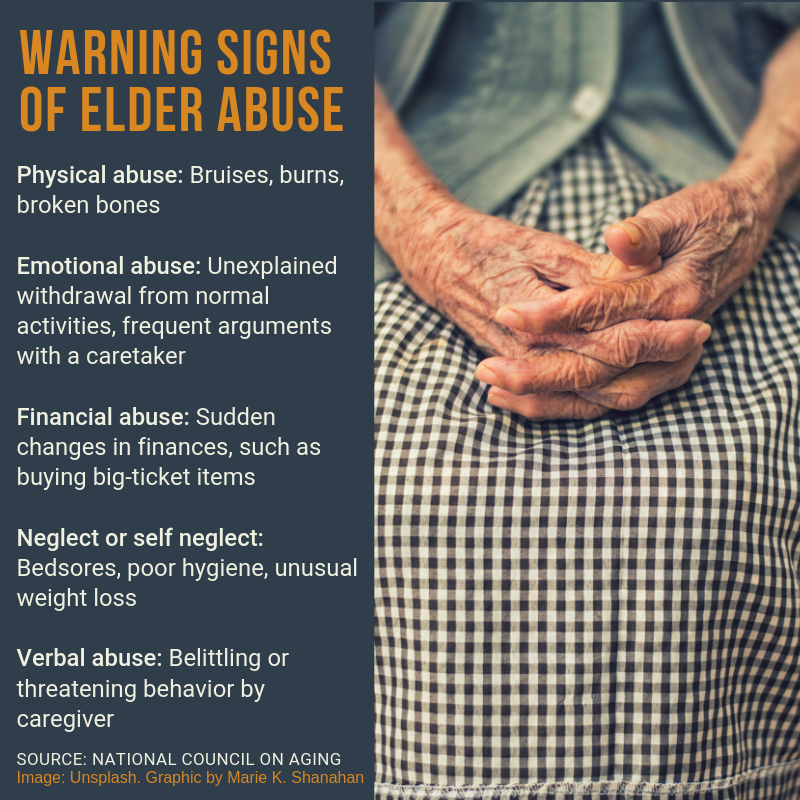Taking Action on Elder Abuse – World Elder Abuse Awareness Day
Share
There are some characteristics or factors that older people who experience abuse are likely to share. These factors can be grouped into three categories: Environmental, Personal, and Perpetrator. Although these are not the cause of abuse, they should be considered as risk factors and can be helpful in understanding who is at greater risk of abuse.

While one sign does not necessarily indicate abuse, some tell-tale signs that indicate
abuse are:
- Physical Bruises, pressure marks or sores, broken bones, abrasions, and burns
- Sexual Bruises or injury to the genital area which may present as difficulty
moving or sitting - Emotional Withdrawal from normal activities, anxiety, depression, unusual behavior,
or unease - Neglect Bedsores, unattended medical needs, poor hygiene, and unusual weight
loss - Financial Uncharacteristic purchases by the individual or caregiver; failure to pay
bills or keep appointments; questionable behavior
Elder abuse is a lack of respect and violates an older person’s
basic right to feel safe.
…….. up to 14 per cent of older people may experience it in the form of physical, emotional, financial, social or sexual abuse.
Seniors Rights Victoria has issued an alert highlighting the potential increase of elder abuse in the community as a hidden impact of the COVID-19 emergency.
Research suggests that up to 14 percent of older people may experience it in the form of physical, emotional, financial, social or sexual abuse.
Elder abuse can cause stress, anxiety, and depression and lead to increased risk of ill health, hospitalisation and early death.
Seniors Rights Victoria Manager, Jenny Blakey said the major stress being caused by the unprecedented and drastic changes to the social fabric of Australia could cause an increase in elder abuse.
“Elder abuse is any mistreatment of an older person by another person with whom they have a relationship of trust. Often that person is a family member or carer, but it could be a friend or neighbour on whom they depend.”
Ms Blakey said in the current economic climate with large numbers of job losses and people being unable to pay their rent or home loans, the trend to move and live with older parents or other relatives will be driven by financial necessity.
“Depending on family relationships and arrangements this may work out, however, at Seniors Rights Victoria we deal with cases that have resulted in elder abuse.”
On many occasions, the problem of elder abuse is raised with Seniors Rights Victoria by a family member or a friend who has concerns for a person’s welfare.
The different forms of elder abuse are ways for another person to take over or control the life or property of an older person, Ms. Blakey said.
Some forms of elder abuse are criminal acts, for example acts involving theft or fraud. Elder abuse is a lack of respect and violates an older person’s basic right to feel safe.
Warning signs of elder abuse
- The older person seems fearful, worried or withdrawn.
- They seem nervous or anxious with certain people.
- Family and or friends are denied access to the person.
- They no longer go out socially or get involved in activities.
- Unexplained injuries such as bruises, broken bones, sprains, cuts etc.
- Unpaid bills, unusual activity in bank accounts or credit cards
- Changes to a will, title or other documents.
- Disappearance of possessions.
- Poor hygiene or personal care.
- Absence of needed health items: hearing aids, dentures, medications.
Victoria’s ageing population
One of the most critical demographic changes is that more Victorians are growing older than ever before. As of 30 June 2019, 30.6% of Victorians enrolled to vote were aged 60 and over – that is in excess of 1.2 million voters.
Overall, more than 20% of the Victorian population is aged over 60 and that number is increasing rapidly.
By 2031, Victorians aged over 60 living in Greater Melbourne will comprise 22% of the population, and almost a third (31%) of Victorians living in rural and regional areas will be aged over 60.
Media release from https://seniorsrights.org.au/community-alert-on-increase-of-elder-abuse/












